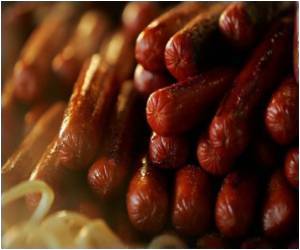In its first known case of horsemeat contamination as the scandal spread further across Europe, Russia said it had found horsemeat in a shipment of pork sausages imported from Austria.

Photographs published on the website of the agricultural watchdog showed the plastic-packed sausages labelled "Frankfurter", with the producer named as Landhof in Linz and the importer named as a Moscow-based company.
Unlike the cases of contaminated meat elsewhere in Europe, the sausages were labelled not as pure beef but as containing only pork.
The sausages "came two days ago from Austria," Alexei Alexeyenko, an aide to the watchdog's chief, told AFP.
"The shipment is over 20 tonnes," he said, adding that the enterprise that supplied the meat had been struck off the list of suppliers to Russia, Kazakhstan and Belarus.
The sausages were labelled as produced on February 11 and said to contain 80 percent pork as well as other non-meat ingredients.
"The source of this meat is unknown," he noted, adding that old ill animals could have been used to make it.
A vast food scandal has erupted across Europe after horsemeat was found in supposedly beef ready-made meals and burgers on sale in supermarkets in Britain and Ireland, where eating horse meat is strictly taboo.
Among various companies implicated in the scandal, Swiss food giant Nestle last week withdrew dishes destined for restaurants in Portugal, Spain and Italy.
Portugese authorities said Wednesday they had seized 79 tonnes of wholesale food containing horsemeat at factories that distributed meat to supermarkets, as well as thousands of ready-made meals such as lasagne, meatballs and burgers.
The discovery in Moscow revealed the spread of horsemeat labelled as other types of meat has reached Russia, which prides itself on strict controls on meat imports, frequently implementing sweeping bans.
Horsemeat is not entirely taboo in Russia but is a traditional delicacy in some regions and can be found openly on offer in many restaurants and stores.
But the country's chief sanitary doctor Gennady Onishchenko earlier expressed horror at a proposal last week by German economic development minister Dirk Niebel to use the confiscated horsemeat to feed the poor.
"The very idea gives you the shudders," Onishchenko told the Interfax news agency on Sunday.
Embarrassingly for the European Union, the discovery of the horsemeat sausages came just a day after a European Commission official, Ladislav Miko, said in Moscow that there was "no risk that these food products from the European Union were imported into Russia," quoted by ITAR-TASS.
The fallout from Europe's horsemeat scandal has spread far outside the continent, with an imported lasagne brand pulled from shelves in Hong Kong and a new row over the treatment of horses farmed in the Americas.
Nestle last week was forced to yank products off the shelves in Spanish and Italian supermarkets after detecting horsemeat in deliveries from a German supplier. It said Monday it would stop buying all products from Spanish group Servocar after traces of horse were discovered.
The European Union is carrying out tests for horse DNA in meat products, trying to reassure nervous consumers that their food is safe and to halt the spiralling horsemeat scandal.
Source-AFP
 MEDINDIA
MEDINDIA

 Email
Email






